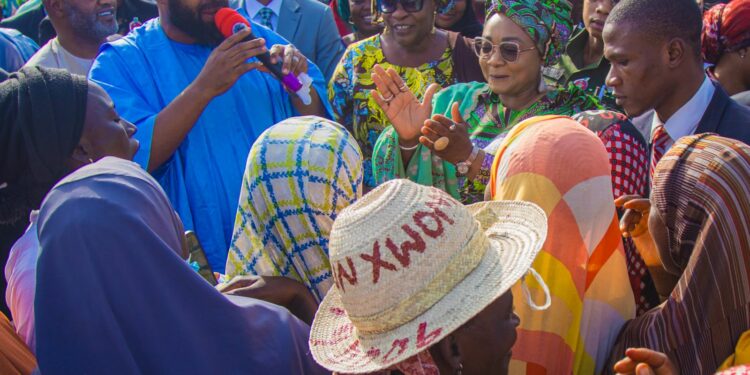Minister of Women Affairs Hajiya Imaan Sulaiman-Ibrahim on yesterday commended the World Bank and the Governor of Niger State, Hon Mohammed Umaru Bago, as she commissioned the Nigerian for Women Project (NWFP) Bokwosayi women rice processing factory at Gwachipe, Gurara Local Government Area of Niger State.
The Minister described the transformative milestone as a journey towards redefining empowerment for Nigerian women, representing a beacon of hope, a symbol of progress, and a testament to the resilience and potential of Nigerian women, especially in Niger State.
She also commended the exceptional support for the NFWP and the integration of childcare facilities within the factory, which, according to her, is a groundbreaking initiative that addresses one of the most significant barriers to women’s economic participation—balancing work and childcare.
“This step exemplifies forward-thinking leadership and sets a precedent for inclusive economic planning”.
According to her, the Nigeria for Women Project (NFWP) exemplifies the Federal Government of Nigeria under President Bola Ahmed Tinubu’s unwavering commitment to achieving gender equality and enhancing women’s socio-economic outcomes.
Noting that it is ‘Women of Clock’, she stated that the project was designed as a long-term and multidimensional intervention that addresses the systemic and market barriers that have long hindered women’s progress.
Sulaiman-Ibrahim added that through the collaborative efforts of the Federal Government, the World Bank, and strategic partners, the NFWP has made remarkable strides in improving household welfare, fostering economic empowerment, and uplifting communities.
She thanked the World Bank and the Governor for making the women’s dreams possible. She expressed happiness that the women are now empowered to provide for their families and their communities, which in turn would lead to a sharp reduction in cases of sexual and gender-based violence against women.
The minister also emphasised the need for family cohesion, asserting that empowered women would be able to train their children, who would, in turn, fill their families’ economic gaps.
On his part, Mr Micheal Ilesanmi, on behalf of the Country Director, stated that the NFWP was aimed at economically empowering Women in the country to be self-sufficient, improve the livelihood of their households, and contribute to the economy of the state.
He narrated the experience of one of the Emirs, who expressed that the project has profoundly reduced the number of complaints from wives against their husbands for not caring for their families’ needs.
Ilesanmi added that each of the processing stations can produce 2 tonnes of rice per day, which is in addition to the quantities made possible by the over 29 rice factories in the state.
Governor Bago, in his remarks, said he was happy because when a woman is empowered, the effect trickles down to all family and community members.
He promised his administration’s continued support for women and thanked the Minister for finding time to honour him and the women in the state.



